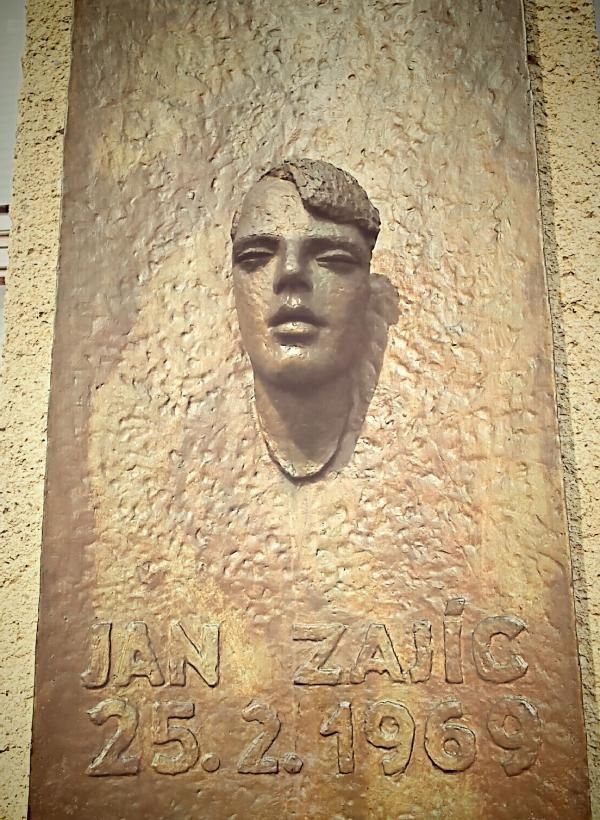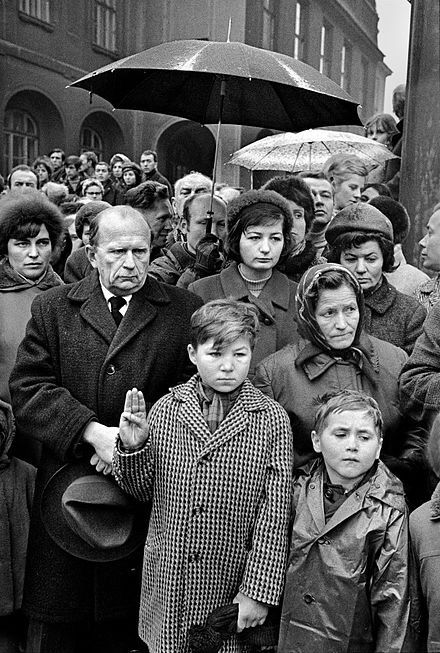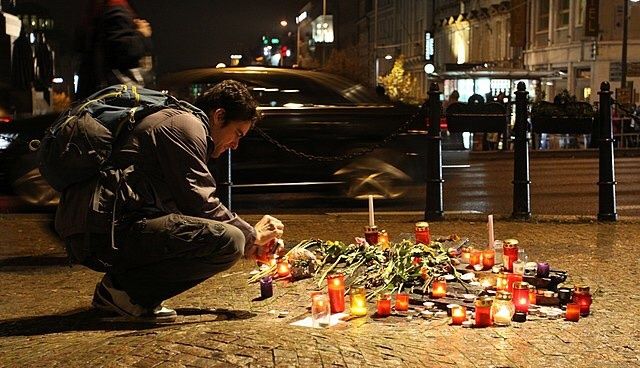
哲學博士生,專長為意識哲學。有鑒追求靈性生活的香港人愈來愈多,惜坊間謬說流行,學院又鮮予重視,誠覺一憾。遂立志融會靈性與知性,助人探索精神世界之各處幽微。
Martyr's Will
(This article is a collection of several articles written before.)
[Shuixiang Sisi] Today, I am lying silently on the cross in the corner of Wenceslas Square in Prague, which was originally to commemorate the two young people who died. One was named Jan Palach and the other was named Jan Zajíc. If Blach was the first torch, Zayitch was the second.
In 1968, when Soviet tanks drove into Prague, Zajic was eighteen and studying at the industrial school in Šumperk. It is said that he was wiser than his peers, and his political knowledge stood out from the crowd. In the face of national disaster, he had the opportunity to emigrate with his family, but he chose to stay and fight. Immediately after Placher's self-immolation in January 1969, Zajic left for Prague to participate in a hunger strike by local students. A group of students camped at the place where Palah set himself on fire. After four days and four nights of cold winter, they pulled out and returned home.
The hunger strike was in vain, but he had the chance to witness Palach's grand funeral. After all, he was deeply shocked. At first, he was convinced that other students would respond to Palacher's case. Unexpectedly, after waiting and waiting, no one came, until more than a month after Palach's death, he resolutely decided to serve as the second torch himself.
On the afternoon of February 25, he left his companions and went to Wenceslas Square alone, never to return.
On the day of his martyrdom, Zayqi hid in a house next to the square, then set fire to his clothes soaked in gasoline, and set himself on fire. According to the plan, he should have rushed out of the square and died where Palach had set himself on fire. It is a pity that he died before he could leave the house, and he died in a splendid manner without anyone witnessing it.

It is said that there was an episode before Palach's death. At the time of his hospitalization, he withstood a fatal fire and held talks with a psychiatrist and a student leader. According to psychiatrist Zdenka Kmuníčková, a group of medical staff had persuaded Palach to speak, calling on the nation not to follow in his footsteps. After all, Palach is not a loose-minded person. He is very aware that he will sacrifice for the righteousness, and insists that he is not alone and that there will be someone to follow. In addition, the student leader Lubomír Holeček also visited Palach and announced his will on the radio on his behalf just hours before his death. According to his retelling, Palacher felt that his mission was completed, and there should be no more suicide protests.
Whether Palacher ever said these words before his death, there is no proof that he is dead now. Whether he had any comrades at that time, whether he expected others to follow suit, and whether he changed his mind in the end, can only be left to the speculation of living people.
In any case, his death brought shock and criticism. Even fellow travelers are not in favor of such a strategy to fight. Zaych is an outlier among his fellow travelers, consciously taking on Palach's legacy. His death in disguise continued Palach's spiritual life.
Palakhliu ink not much. Except for the suicide note signed "The First Torch", later generations could not find much first-hand documents to reorganize their hearts. By contrast, Zajic is quite active on paper. He once wrote a poem to mourn Palach, referring to the fire from the sky stolen by Prometheus. In the open letter signed "Second Torch", he emphasized that his suicide was not to be famous, not to be remembered by bloggers, and not to be mad. He only wanted to arouse the courage of everyone to resist violence, and warned the world not to succumb to Under the lewd power of two or three dictators.
In addition, he also sent a suicide note to his family, showing a more graceful mood. The full text is as follows:
Mom, Dad, Brother, Little Sister!
When you read this letter, I am dead, or not far from it. I know how hard this will hit you, but please don't be mad at me. Unfortunately, we do not live alone in the world. I don't do this because I'm tired of life. On the contrary, I value life too much. Hopefully this will make life better. I know the value of life, I know life is very precious. But I want to bring a lot for you and for all of you, so I'm going to give a lot. After my sacrifice, don't lose heart and tell Jacek to study hard, and so does Marta. Do not accept injustice, in whatever form, my death will bind you. I'm sorry I can't see you again, or the things I love so much. Please forgive me for arguing with you many times. Don't let them make me a lunatic.
Say hello to a bunch of boys for me, and say hello to the river and the mountains.

On the day of Palach's funeral, his classmates made a generous statement, swearing that they would never betray his legacy, and would continue to fight until they regained the freedom they wished for. But what does it mean to carry on his legacy?
The blood is burning, the fire is burning. In addition to Zayqi, there are others who have set themselves on fire in different places within the country. In fact, within half a month of Palach's passing, the Czech police have recorded ten cases, including Palach, a total of two cases of death. From January to April 1969, the police recorded 29 self-immolations throughout Czechoslovakia, mostly blue-collar victims. Palach's followers seem to be more than Zajic imagined, but because the authorities blocked the news, many martyrs died in silence and no one was interested.
Having said that, even fellow travelers may not hope that the rest of the people will use the same tragic means to fight again. How to praise Palach without causing suicide has become a question that every remaining conscience must answer carefully. Palacher's death in disguise forced everyone to reflect on how to be a man of integrity in the worst of times.
The playwright Václav Havel recorded a passage explaining the meaning of Palach's death, but unfortunately it was not possible to broadcast it on state-run radio. He said that Palach's actions were like shouting for everyone, expressing everyone's pain with the ultimate means. He affirmed that self-immolation was a deliberate political action, and that the only right way to carry on Palacher's legacy is when everyone fights for his own beliefs, insists on doing what he sincerely believes is right, and guards against becoming indifferent, hesitant, or even hopeless. Of course, he is the best version of himself.

Father Tomáš Halík, a former classmate of Palach, was active in the underground church at that time. Looking back on his life, the reason why he decided to take a secret order and risked serving the church that was not seeing the light of the sun was when Palach set himself on fire.
He believed that Palach's death not only rewritten Czech politics, but also recast the Czech spirit. Although the impact was not immediate, after all, it deeply touched the conscience of some citizens, including Hari himself.
After the tragedy, he was determined to stay in his home country, and he sacrificed his life in a way different from Palach. He felt that life was no longer just for himself and his family. Presides over the underground church as a priest, that is, his answer to Palach's exam questions.
The scholar Jiřina Šiklová, who quit the Communist Party after the Soviet invasion and lost her university job, has since secretly written articles for underground circulation. Asked what inspired Palach's death, he believed that in any community there is always something worth dying for. Even today, those who survived are obliged to remember Palach's feat and delve into its symbolic meaning.
When I first started writing the introduction, some passing readers felt uncomfortable, probably thinking that I was inciting others to set themselves on fire. However, let's not say that Palakh is a martyr whom the Czech Republic publicly mourns. Since someone is willing to sacrifice bravely and cry for the silent majority, isn't it worth the survivors to remember everything he did? Shouldn't we work harder to spread the word, so that everyone has the opportunity to reflect on the legacy of the martyrs?
Like my work?
Don't forget to support or like, so I know you are with me..
Comment…